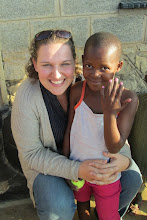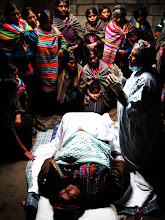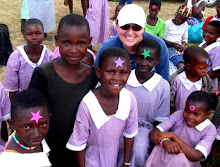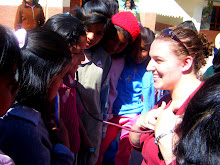"Of course, Sesotho should be taught in schools!" I defended adamantly to my colleagues. They laughed to see me in the throngs of yet another friendly, but typical "staffroom debate." "But why, Limphosa?!"replied our Agriculture teacher, Ntate Musi. "Why should we be speaking Sesotho?... What good has it ever done for Basotho?" "Yes!" echoed my friend, Chris, passionately. "English! Sekhooa is the only way for people to make money in today's world... It's globalization!"
I shook my head, exasperated to find myself, yet again, defending the merits of a culture, not even my own. "It's important." I reasserted stubbornly. "Lesotho is the ONLY country in the world where Sesotho is taught and spoken... If you don't teach it to your children, people will stop speaking it. It will disappear, and with it, an important part of YOUR Basotho heritage." Laughter rolled across the staffroom again, at my apparent naivete. "Heritage?!" They railed unanimously. "What do we care about heritage? We need money! The people are starving; working too hard just to be poor! The only thing we need is money..." Ntate Musi advocated. "You say that, and I understand... But being "developed" does not have to mean loosing the old ways. Why can't your children have both?" I reasoned, trying to bring them all around. It seemed fruitless... "We can't have both though. Sesotho is no good... It only holds us back. We have to be like the Americans and speak English!" Ntate Musi continued admiringly.
I felt my heart sink a little bit. THIS, I thought, is the problem with globalization.
You see, when I first joined Peace Corps, I did it with an inordinate degree of apprehension. Not because I questioned my ability to learn a new language, or live without electricity, but because I questioned (and still do) the ethics of development work.
Working in the global development sector is conflicting for me. It's difficult because I'm an anthropologist; I value cultural difference and preservation. I think that there are some things in the world which, by their very nature, defy monetary value... Languages; knowledge of indigenous plants and animals; diverse ways of understanding and experiencing the human body, endless forms of expression through song and dance; knowledge of medical practices; unwritten histories, disparate ways of viewing the world and the role of human beings in that world. The value of these things to the human race, in my opinion, could not possibly be over estimated.
Unfortunately, in societies where poverty overwhelms and death lurks in the shadows, indigenous languages, customs, and unique world-views are often sacrificed at the alter of "progress." At the time they seem a small price to pay for health, a full belly, and physical comfort. So it's not surprising that, so often, the very peoples whose cultural heritages are being lost, fail to truly assess the cost of globalization, until it's too late. Development becomes incorrectly associated with being "less traditional" and "more western."
As a teacher, I see it every day... My students dream of cars, electricity, and "sharp" clothes, as they say. They aspire to careers that will give them brick houses in the capital city, Maseru... And the careers that get them there matter very little to most. When I ask my Form D's what they want to be when they grow up, they often reply, "Maybe a nurse, or engineer. But if not that, then perhaps a teacher or travel agent... Whatever I can." A career is not a pursuit of passion, interest, talent, or even moral obligation. It is solely the product of opportunity... A necessary step to a life they deem to be more desirable, modern, and, by association, "westernized." They view education as a mere means to escape.
This means that, for many Basotho, village life is increasingly vilified as undesirable and archaic. Educated Basotho gasp in shock when I tell them I live without running water and electricity. "But why?!" They say with genuine confusion. "Don't you want to move to town?!" "Not at all!" I answer, laughingly. "I absolutely love my village. There is no place else in Lesotho I would rather live," I tell them honestly. They just shake their heads in disbelief. My skin-color, sun-glasses, and well-tailored clothes mark me as the ultimate conundrum... A westerner who had the life they desperately dream of, and gave it all up gladly for a thatch-roofed rondaval in a rural Basotho village.
For me, this resistance to, and even lash-back against a "traditional Basotho lifestyle" is a sad product of globalization, and an inevitable sign of cultural loss. It saddens me, because it is not necessary.
While we anthropologists may fight for the preservation of culture, most of us understand that "preservation" does not necessarily mean inhibiting "progress." In fact, any good anthropologist would tell you that the concept of "freezing" a culture in time is not only impossible, but absolutely naïve. No culture is static. Rather ALL cultures are constantly in a process of evolving and adapting to changes in political structures, environments, climates, religions, technology, ect. And this isn't a bad thing; it's inevitable.The sad part comes when that evolution of culture leads to it's own destruction or loss. When cultures dissipate and are lost to history because people cease to remember, celebrate, and practice them into existence.
THIS was my fear as a Peace Corps Volunteer... When I joined Peace Corps to be a teacher, I was worried that by teaching IN English, and with an inherently western perspective, I would inadvertently be contributing to the slow demise of Basotho culture.
After a year in Lesotho, however, I understand more than ever, that it doesn't have to be that way... Although it so often does, development does not have to destroy culture. It's possible for a country and society to maintain it's own unique heritage and world-view, but only when it dedicates itself to forging a path ahead that specifically protects such legacies. Doing this requires that indigenous peoples be the makers of their OWN future. They have to be involved in their own development as the "designers," rather than just the menial office staff or manual labor. It requires that cultural practices and traditions are evolved and incorporated into modern society... Whether through cultural days in schools, or new interpretations of rite of passages, as when many Basotho choose to have a "white wedding" but ALSO pay labola (the bride-price). It requires tolerance and respect on the part of neighboring countries and political powers... International allies who understand that being different does not make a society primitive or unevolved. It requires education performed from the viewpoint of that society; education that emphasizes what is relevant to those people. For example, Religious Studies, Sesotho and Agriculture are all VERY important components of the education system in Lesotho. But more than all that, there has to be a sense of pride and identity that is maintained in the minds and hearts of the people themselves... A respect and tolerance for the "old ways; an understanding that being "developed" doesn't have to mean being "American" or being "British." The consciousness to recognize inherently western perspectives in their midst and resist them. This discrete invasion of western thoughts and influences, over time, removes the ability of diverse cultures to formulate their own world views... And along the way, something truly valuable is lost to the world forever.
Everyday I walk a delicate tight-rope, trying to balance my own pride in my culture and country, with a desire for the Basotho people to resist the overwhelming force of western influence. I can only hope that, with enough humility and introspection, I will leave Lesotho having done more help than harm to it's cultural legacy. I hope that by teaching my girls self-confidence and to think independently, they are learning to forge their OWN ideas about what it means to be a strong and liberated women- even if those ideas often conflict with my own. That by giving all my students the skills to go forth and be lawyers, doctors, and engineers, they will return to their country and lead it for themselves. That through my book project and friendships, I will spend more time listening than I do talking. That by showing my colleagues the honest truth of America, rather than allowing them to keep it on a pedestal as the "nation without flaws," they will understand that there is no secret path that leads to wealth and power... It's a future they can and should forge for themselves, according to their own desires for their country.
Because only one thing is certain in this day and age... Development will happen. I only hope that, as it does, the Basotho people will be the ones independently and confidently leading the way for this small, but incredibly unique and culturally-valuable society.
With Love from Lesotho... -Mary E.
Subscribe to:
Post Comments (Atom)






No comments:
Post a Comment